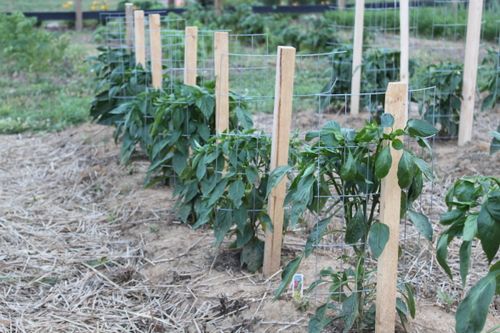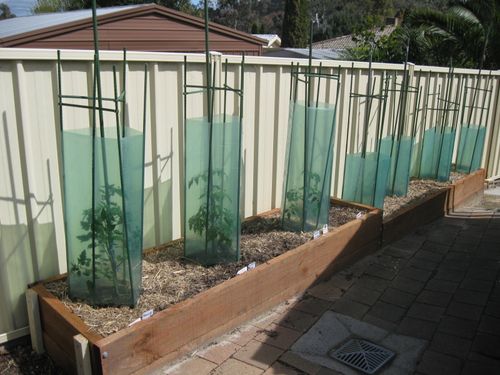- Bunnings Workshop
- >
- Discussion
- >
- Garden
- >
- Tomato staking styles
Tomato staking styles
- Subscribe to RSS Feed
- Mark Topic as New
- Mark Topic as Read
- Float this Topic for Current User
- Bookmark
- Subscribe
- Mute
- Printer Friendly Page
- Mark as New
- Bookmark
- Subscribe
- Mute
- Subscribe to RSS Feed
- Highlight
- Report Inappropriate Content
Tomato staking styles
What do others do?
- Mark as New
- Bookmark
- Subscribe
- Mute
- Subscribe to RSS Feed
- Highlight
- Report Inappropriate Content
Re: Tomato staking styles
I just use traditional stakes and ties.
But this idea would be great if you had the space - a combination of stakes and fencing wire.
- Mark as New
- Bookmark
- Subscribe
- Mute
- Subscribe to RSS Feed
- Highlight
- Report Inappropriate Content
Re: Tomato staking styles
We obviously need a little help with the non-conventional staking approach used in our garden. ![]()
- Mark as New
- Bookmark
- Subscribe
- Mute
- Subscribe to RSS Feed
- Highlight
- Report Inappropriate Content
- Mark as New
- Bookmark
- Subscribe
- Mute
- Subscribe to RSS Feed
- Highlight
- Report Inappropriate Content
Re: Tomato staking styles
Here's the design I'm trying out. Pretty happy with how it's working. ![]()
- Mark as New
- Bookmark
- Subscribe
- Mute
- Subscribe to RSS Feed
- Highlight
- Report Inappropriate Content
Re: Tomato staking styles
Your Bamboo stakes look awesome and your plants seem to be happy too. We just used those wire stands and they were fine, but in the hot sun, the wire cooked lines on the fruit where they intersected. Next year, we're keen on trying the over and above approach. We saw it at a nursery and our neighbour does it too. They have potted plants with a tall frame above, hang string from the "roof" and run the tomatoes up that. The beauty is they can easily cover it with shade cloth on really hot days. We have hung on to an old swing set and planning to try this method using that. Still plenty of height to place it over a raised garden bed, but pots are good too.
- Mark as New
- Bookmark
- Subscribe
- Mute
- Subscribe to RSS Feed
- Highlight
- Report Inappropriate Content
Re: Tomato staking styles
Looking great @timjeffries! We went the real cheap way and grabbed some branches from the backyard and ran them both vertically and horizontally for our vegie garden. We also came across a free metal storage unit which was dismantled so we used some of it's components as stakes on our tomatoes. We thought it was a great idea although with the warm weather it seems to have burnt some of our vegies and the leaves too - similiar to @RosieW issue.
- Mark as New
- Bookmark
- Subscribe
- Mute
- Subscribe to RSS Feed
- Highlight
- Report Inappropriate Content
- Mark as New
- Bookmark
- Subscribe
- Mute
- Subscribe to RSS Feed
- Highlight
- Report Inappropriate Content
Re: Tomato staking styles
Hi Tim
We transplanted these tomatoes on 16 October, a few weeks before we normally would, so I wanted to protect them as much as possible just in case we had a few late frosts here in Canberra. It was just as well, because 2 days later we had very high winds which would have severely damaged them if not for the tree guards I placed around them. They survived without a scratch.
I used the regular tomato cages in a triangle formation with a central stake to secure the plant to but added other tomato stakes to firmly stake out the tree guard so that it didn't blow around too much. I buy the plastic tree guards by the metre which has perforations every metre. I have purchased plastic tree guards from Bunnings in the past but they came in packets that are pre-cut to 40 or 50cm which I find is not sufficient for my purposes. Purchasing it by the roll is much better because you can determine exactly how high you want your tree guard to be. If I need to protect a larger plant and need a larger diameter I use 3 or 4 of the tree guards and using several extra tomato stakes to slip the tree guards over the stakes to surround the plant. After the danger of frosts have passed I will remove the plastic tree guards but keep the tomato cages in place. We also have the round steel type of tomato cages but we tend to mainly use them for supporting zucchinis and cucumbers etc.
For securing any of my plants to stakes I use Jolly Tree Ties (as pictured below) which are a stretchy T-shirt type of material (available from Bunnings). I also use it in extra long lengths to secure across my snow peas and other climbing vegetables such as peas and beans to prevent them falling forward. When the season is over I remove them and soak them in disinfectant in a large bucket, dry them and store them away for the next season.
I hope the information about the tomato cages helps Tim and other Workshop members.
Why join the Bunnings Workshop community?
Workshop is a friendly place to learn, get ideas and find inspiration for your home improvement projects
You might also like

We would love to help with your project.
Join the Bunnings Workshop community today to ask questions and get advice.









